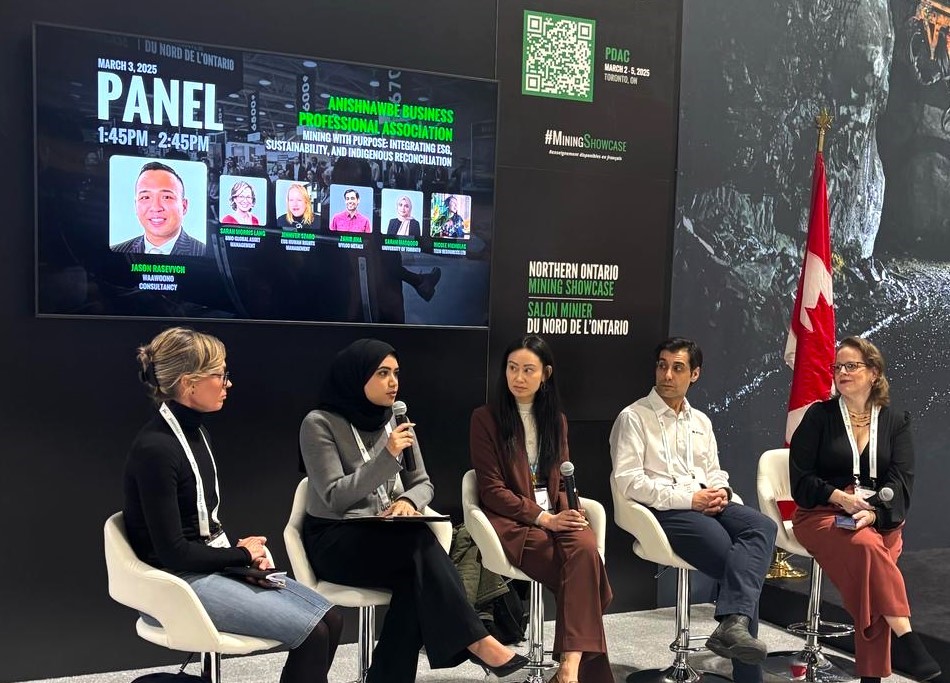Secondary menu
IHRP Clinic Student Highlights First Nations Perspectives on Mining Development in Ontario at the 2025 PDAC Convention
 Sara Maqsood (second from left) addressing the audience at PDAC Convention 2025
Sara Maqsood (second from left) addressing the audience at PDAC Convention 2025
On March 3rd, Sara Maqsood, a student from our IHRP Clinic (JD Candidate, 2025), participated in a panel at the 2025 Prospectors & Developers Association of Canada (PDAC) Convention in Toronto. The annual PDAC convention is the world’s largest and most important international mining industry gathering, attracting approximately 30,000 people from 130 countries each year. Sara discussed the impact of mining in northern Ontario’s Ring of Fire on First Nations communities, drawing upon her research in one of our IHRP Clinic projects this year.
Sara focused her remarks on the human rights implications of mining development in the Ring of Fire — a 5,000-square-kilometer region in northern Ontario that lies within Treaty 9 territory. Known for its potential to contain critical minerals vital for low- and zero-emission technologies, the Ring of Fire has experienced a recent surge in mining claims, along with proposals for new roads and infrastructure. These developments have sparked serious concerns among First Nations communities. Sara pointed out how these changes have underscored significant issues, particularly the adequacy of current consultation processes.
Over the last year, Sara and her IHRP Clinic partner Betel Woldu (JD Candidate, 2026) have been working with the Anishnawbe Business Professional Association (ABPA) and students at the Investor Protection Clinic at U of T Law, to research whether current consultation practices by both government and mining companies uphold the principle of free, prior, and informed consent (FPIC), a fundamental aspect of First Nations rights under international law. Additionally, the research examines the potential impacts of mining and infrastructure projects on traditional lands, along with broader human rights implications, especially when communities are not properly consulted.
Students have been conducting interviews with members of affected First Nations communities and mining companies operating in the Ring of Fire region to prepare a detailed advocacy report with case studies and firsthand accounts regarding the human rights impacts of mining in northern Ontario. This report is intended to support the advocacy and educational efforts of our project partner, ABPA, and may also inform future legal advocacy in other forums.
The PDAC Convention panel, hosted by the ABPA, brought together experts from the mining industry, finance, and academia to discuss the significance of Indigenous engagement, consultation, and consent in mining development on Indigenous lands. The discussion centered on the vital intersection of Environmental, Social, and Governance (ESG) principles, sustainability, and Indigenous reconciliation within the mining sector.
Sara concluded her presentation by inviting the audience to engage further, encouraging them to reach out to us to learn more or contribute to our project (see contact details below) and emphasizing that “First Nations perspectives are essential to fully understanding and addressing the human rights and environmental challenges posed by mining development in the Ring of Fire.”
Later reflecting on her experience, Sara shared with her network that “these discussions are crucial for ensuring Indigenous rights remain at the forefront of resource development conversations.” We are proud not only of the contributions our Clinic students make, but also of their recognition of the importance of dialogue and action in addressing human rights violations on Indigenous land.
Contact Information:
James Yap
james.yap@utoronto.ca
Acting Director, International Human Rights Program, University of Toronto Faculty of Law
Nabila Khan
nabila.khan@utoronto.ca
Research Associate, International Human Rights Program, University of Toronto Faculty of Law
